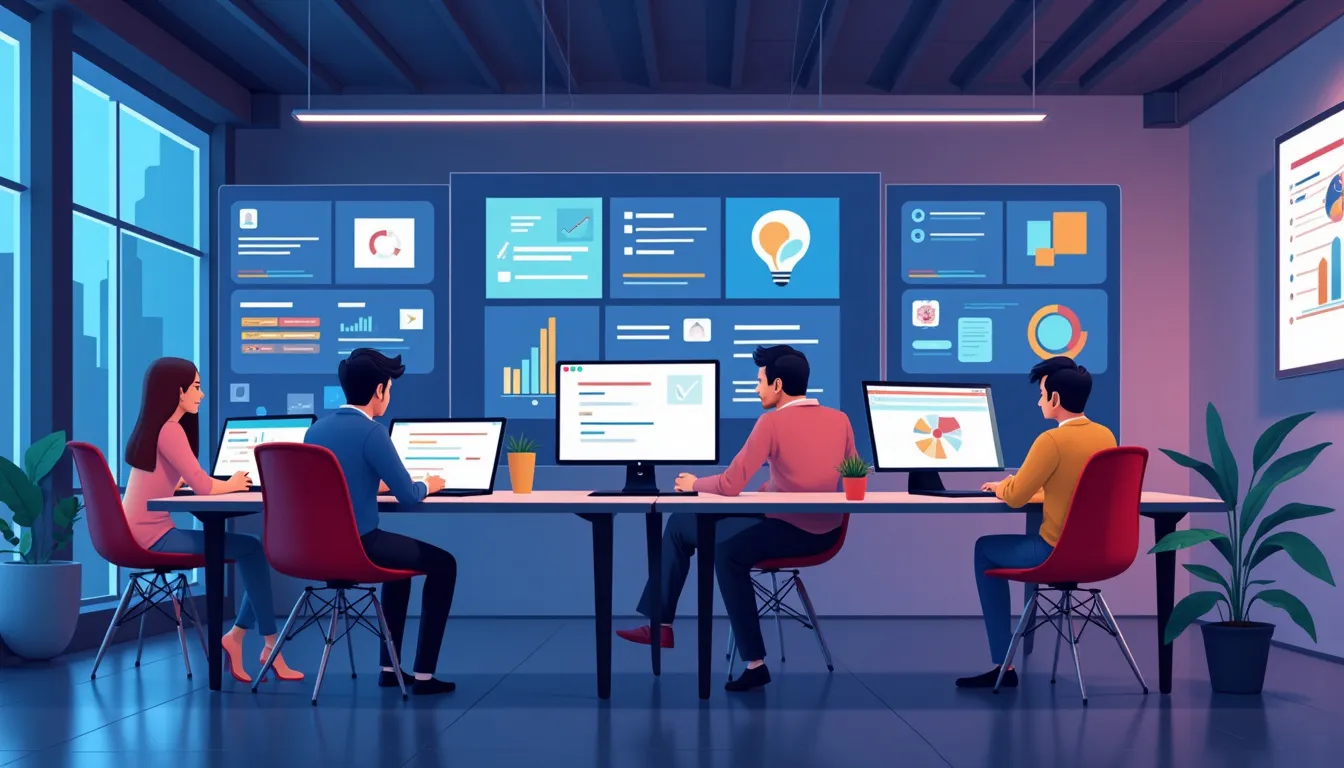In today’s relentless, fast-paced world, staying productive is not just a preference but a necessity. Whether you’re juggling numerous projects at work, managing a business, or simply trying to keep your personal life organized, the pressures to remain efficient are unceasing. The crux of the issue is that traditional methods of managing tasks, communication, and collaboration often fall short, leading to increased stress and decreased effectiveness. This is where artificial intelligence (AI) steps in as a game-changer. AI is not just a buzzword; it’s a robust tool that’s revolutionizing productivity across various domains. Harnessing the power of AI tools can streamline your workflows, automate mundane tasks, and ultimately, enable you to focus on what really matters.
The emergence of AI tools for productivity is akin to having a personal assistant who never sleeps, never tires, and constantly learns from every interaction. These tools can manage your schedule, prioritize tasks, enhance communication, and foster seamless collaboration among team members. As someone with extensive experience in safety and artificial intelligence, I’ve witnessed firsthand how effectively integrating AI tools can transform productivity levels. Not to mention, on a personal note, grappling with ADHD and OCD can add layers of complexity to task management. AI tools serve as indispensable allies in mitigating these challenges by bringing a structure that’s intelligent, adaptive, and personalized.
Furthermore, the importance of utilizing AI tools for productivity cannot be overstated. Imagine having an assistant that preempts your needs, organizes your day in a way that aligns with your peak performance times, and even ensures that no communication thread is ever lost in the digital abyss. It’s not just about doing more in less time; it’s about doing better with the time you have. As we explore the landscape of AI tools designed to boost productivity, you’ll discover actionable insights, real-world success stories, and how integrating these tools into your daily routine can be a transformative experience, setting you on a path of unparalleled efficiency and success. So, let’s dive in and unlock the potential of AI in boosting your productivity!
Introduction to Productivity Challenges in Today’s Fast-Paced World
In today’s fast-paced world, maintaining high levels of productivity can be a daunting challenge. We are constantly bombarded with distractions from all corners – incessant emails, sudden meetings, and not to mention the endless to-do lists that seem to grow longer by the minute. For those juggling responsibilities both at work and at home, staying productive is more than just a goal; it’s a necessity to keep life on track.
Managing productivity effectively becomes even more complex when you factor in individuals like myself, who deal with ADHD and OCD. These conditions can sometimes make it harder to focus and prioritize, adding another layer of complexity to the productivity puzzle. Despite these challenges, it’s not just about surviving the workday but thriving amid all the chaos.
Introduction to the Role of AI in Enhancing Productivity
This is where Artificial Intelligence (AI) steps in. AI tools for productivity have emerged as game-changers in the modern workflow. Unlike traditional methods which rely heavily on human intervention, AI-driven tools have the uncanny ability to learn, adapt, and optimize themselves autonomously. Yes, we are talking about the software that can not only schedule your meetings but also organize your emails, prioritize your tasks, and even anticipate the next steps in your projects based on your past behavior.
The significance of AI in productivity is not just confined to cutting-edge tech firms or forward-thinking startups; even traditional businesses are catching on to the myriad benefits that AI tools can offer. For someone managing weight loss or daily exercise regimes, AI can even tailor your workout plans and meal schedules based on your personal health data, thereby integrating productivity into every aspect of your life.
Importance of Utilizing AI Tools for Productivity Boosts
But why is it so important to integrate these AI tools into your daily workflow? For starters, AI tools for productivity assist in offloading repetitive tasks, allowing you to focus on what truly requires your human touch—strategizing, creative thinking, and problem-solving. Imagine a scenario where, rather than grappling with scheduling conflicts, you have an AI assistant that arranges everyone’s calendars with a few clicks. Suddenly, you have extra hours in your day to tackle more meaningful work.
Another vital role of these AI tools is in the optimization of your workflow. Take task prioritization, for instance: AI can analyze patterns in your data to find out which tasks frequently get delayed or cause bottlenecks. The insights gleaned can then be used to rearrange your to-do list, ensuring that you focus on tasks that will have the most significant impact first. A personal anecdote: having struggled with maintaining consistent productivity due to my ADHD and OCD, integrating AI tools like these has allowed me to better manage my focus and energy levels, dramatically enhancing my efficiency.
Moreover, these tools encourage better decision-making. Using predictive analytics, AI can help forecast potential challenges or opportunities. Whether it’s market trends for business development or simply figuring out the best time to send that crucial email, the insights provided by AI allow you to act proactively rather than reactively.
Historically, advancements in technology have always aimed to augment human capabilities rather than replace them. AI is no different; it works alongside you, making you more efficient and effective. Case in point: during my weight loss journey, I found that AI-driven fitness apps could track my progress, suggest gradual changes, and even keep me motivated, all of which contributed to achieving my goals faster and more efficiently.
But the real beauty of AI lies in its adaptability. Unlike static tools, AI evolves and improves over time, learning from every interaction. This is particularly beneficial for those of us who have unique challenges and constraints. For example, tailored AI tools can adjust to your working style, whether you need longer breaks, more reminders, or customized notifications, making your workflow more personal and effective.
In summary, the embrace of AI tools for productivity is not just a convenient add-on but a critical step towards a more optimized, efficient, and balanced work-life routine. By leveraging AI, we can turn the seemingly insurmountable mountain of tasks into manageable molehills, enabling us to focus on what truly matters. If you’re looking to take your productivity to the next level, integrating AI tools is not just an option – it’s a necessity. Stay tuned as we delve into specific AI tools for task management that can transform your daily workflow.

Top AI Tools for Task Management
In the realm of productivity, task management stands as a cornerstone. The rise of AI tools for productivity is revolutionizing how we handle our daily tasks, ensuring that nothing slips through the cracks.
Task Automation and Scheduling: AI Tools That Simplify Task Management
Imagine having a personal assistant who never sleeps, keeps track of every deadline, and helps prioritize your workload. AI-powered task management tools are designed precisely for this role. These tools automate routine tasks, schedule deadlines, and even predict project timelines based on historical data.
For example, consider Google Calendar’s AI features. It doesn’t just keep track of your meetings; it suggests optimal meeting times, integrates with your email to auto-add events, and syncs across devices seamlessly. More advanced applications like Todoist use AI to suggest daily tasks based on past behavior, ensuring you focus on what truly matters.
Features and Benefits of Popular AI Task Management Tools
One exemplary AI tool heralded in task management is Trello. Enhanced with Butler automation, Trello’s AI capabilities facilitate automatic task sorting, workflow trigger initiation, and task assignments based on user-defined rules. For instance, you can set it to move tasks forward as they reach specific stages of completion, keeping your projects on track with minimal manual effort.
Asana, another leader in this space, leverages AI to help teams visualize work progress through timelines and task dependencies. Its AI engine can recommend next steps and identify potential bottlenecks in a project, enabling smooth project execution.
Microsoft To Do leverages AI to create smart task lists. By learning from your habits, it surfaces tasks you’re likely to forget and schedules your day for maximized efficiency. Combined with My Day, an intelligent feature suggesting daily tasks, it provides an intuitive and personalized task management experience.
One more stellar example is Monday.com. Known for its highly visual and customizable workflow management, it uses AI to integrate with various tools, automate repetitive tasks, and ensure efficient team communication. Monday.com’s timeline view and calendar sync are powered by AI, providing a comprehensive overview of project milestones and deadlines.
The benefits of using these AI tools span beyond mere convenience. They help eliminate human error, which is often the root cause of missed deadlines and overlooked tasks. By automating repetitive tasks, AI tools free up cognitive load, allowing professionals to focus on more complex and creative endeavors.
Case Study: AI Tool Improving Task Management Efficiency
Consider the experience of a mid-sized marketing agency based in New York. Before integrating AI-powered task management tools, the agency relied on a paper-based system and sporadic use of Excel spreadsheets. The result? Missed deadlines, busy days packed with last-minute scrambles, and a team constantly chasing their tails.
The agency decided to integrate ClickUp, an AI-driven productivity tool renowned for its multifaceted task management capabilities. ClickUp’s AI features include automatic task assignments based on team members’ availability, real-time project tracking, and predictive analytics to forecast project completion times.
Within three months of transition, the agency saw a dramatic reduction in missed deadlines by 40%. The predictive analytics feature allowed team leaders to redistribute workload efficiently, avoiding burnout and improving overall team morale. Moreover, the visual task tracking helped in maintaining a clear overview of project statuses, right on the dashboard, eliminating the need for countless meetings and follow-ups.
Interestingly, the agency’s team members initially skeptical about the AI transition reported a more seamless workflow. One project manager aptly noted, ClickUp’s AI features ensure I’m not only on top of my tasks but also ahead of potential issues. It’s like having an extra set of eyes on everything.
As we witness through such case studies, AI tools for productivity, specifically in task management, provide undeniable advantages. These tools not only revamp traditional task management methods but also empower teams to work smarter and achieve goals more efficiently.
The integration of AI in task management is a game-changer. By adopting these tools, you can automate routine tasks, schedule effectively, and maintain a comprehensive overview of projects. The key is to explore these tools, find what fits best with your work style, and embrace the power of AI to enhance productivity.

AI Tools for Communication and Collaboration
In the fast-paced business world, effective communication and seamless collaboration are crucial. AI tools are revolutionizing these areas by streamlining interactions and enhancing teamwork. With a blend of intelligent features and user-friendly interfaces, these tools are elevating how teams communicate and work together.
Enhancing Team Communication with AI-Powered Tools
Effective communication lays the groundwork for successful collaboration. AI-powered communication tools utilize natural language processing (NLP) and machine learning to improve clarity, speed, and accuracy in team interactions. For instance, AI chatbots can automate responses to frequent queries, freeing up time for more complex tasks. Additionally, AI-driven language translation services enable teams from different linguistic backgrounds to communicate seamlessly.
A compelling example of AI enhancing team communication is Microsoft Teams’ integration with AI. The platform includes features like real-time translation and speech recognition, ensuring that meetings are accessible and inclusive for global teams. Imagine being in a critical meeting where real-time captions and translations automatically appear, removing language barriers and fostering a productive environment. This demonstrates the potent combination of AI and communication tools in enhancing team dynamics.
Collaboration Platforms Integrated with AI Functionalities
Beyond communication, AI tools are redefining collaboration by integrating advanced functionalities into popular collaboration platforms. AI can streamline workflow, manage projects, and even predict project bottlenecks. Tools like Slack, Asana, and Trello have embraced AI to offer features that optimize team collaboration.
Take Slack, for example. This widely-used platform leverages AI to offer functionalities such as smart notifications, task prioritization, and automated reminders. These features ensure that important messages are not lost in the avalanche of daily communications and that team members are reminded of crucial deadlines. AI-driven algorithms analyze user behavior and suggest appropriate channels or groups, enhancing focus and reducing distractions.
Asana and Trello, on the other hand, utilize AI to predict project timelines and provide insights into potential risks. By analyzing past project data, these tools can forecast delays, enabling teams to take proactive measures. Think of it as having a project manager who anticipates every hurdle before it appears, ensuring a smoother workflow.
Real-World Applications and Success Stories of AI Tools in Team Collaboration
AI tools for productivity have proven their worth in real-world scenarios, transforming team collaboration in various industries. One notable success story is that of IBM Watson Workspace. By employing Watson’s AI capabilities, the platform offers predictive insights and intelligent recommendations, streamlining teamwork and decision-making processes.
Consider a scenario within a major marketing firm where diverse teams work on multiple campaigns simultaneously. IBM Watson Workspace simplifies project management by creating intelligent to-do lists, identifying priority tasks, and offering suggestions based on current trends. This allows team members to focus on creative tasks while AI handles the logistical complexities, significantly boosting productivity.
Another example is Cisco Webex, which employs AI to facilitate smarter meetings. With features like real-time transcription, noise reduction, and video conferencing analytics, Webex ensures that meetings are efficient and productive. Imagine a meeting where background noise is minimized, participants’ speech is transcribed accurately, and post-meeting summaries are automatically generated. This not only saves time but also ensures that key points and action items are not overlooked.
In my personal experience, leveraging these AI tools has been transformative, especially in managing my professional responsibilities alongside personal challenges like ADHD and OCD. Setting up automated reminders and prioritizing tasks with AI-driven insights has allowed me to stay on top of my workload without feeling overwhelmed. Tools that reduce cognitive load and offer predictive assistance have been game-changers in maintaining productivity.
For instance, during a critical project phase, using AI tools like Trello and Slack meant that even as distractions arose, automated notifications and task categorizations kept me on track. The precision and foresight offered by these tools alleviated much of the anxiety associated with project management, resulting in a more focused and efficient work environment.
In essence, AI tools for communication and collaboration are indispensable in today’s digital workspace. By offering intelligent solutions that enhance communication, streamline workflows, and provide predictive insights, these tools empower teams to achieve greater productivity. Whether you are managing international projects or navigating daily team tasks, integrating AI-powered tools can transform your collaborative efforts, ensuring that you stay ahead in the productivity game.

Conclusion
As we’ve explored throughout this article, the integration of AI tools for productivity can lead to transformative changes in the way we manage tasks, communicate, and collaborate. Whether you are harnessing AI to streamline your daily to-do lists or leveraging advanced platforms to facilitate seamless team interactions, the impact is undeniable.
By incorporating AI tools for productivity into your daily routines, you not only enhance individual efficiency but also promote a more synchronized and dynamic working environment. It’s about finding the right balance and maximizing your potential while minimizing the time spent on repetitive and mundane tasks. For someone who has navigated the labyrinth of ADHD and OCD, I can attest to how AI has been a game-changer in keeping me organized and focused.
Consider tools that align with your specific needs and challenges. For instance, if you struggle with attention drift, an AI-driven task manager that provides timely reminders and prioritizes your tasks based on urgency can be revolutionary. Similarly, for those wrestling with micro-managing projects, AI-integrated collaboration tools can provide the necessary oversight without the overwhelming stress.
The future of AI is brimming with possibilities, constantly evolving to deliver more intuitive and personalized experiences. Don’t be afraid to experiment and find out what combination of tools best suits your workflow. The technology is here to support you, make your tasks easier, and ultimately free up precious time for strategic thinking and creativity.
Imagine a world where your AI assistant not only manages your calendar but also anticipates your needs, suggesting the optimal time for meetings based on your productivity peaks. Or where collaboration tools predict potential bottlenecks in your project timeline and proactively suggest solutions. This future isn’t far off—it’s already in motion.
As we wrap up this discussion, I offer you a challenge: Give yourself the permission to delegate some of your brainwork to AI. Embrace these technologies, not as replacements, but as supplements to your capabilities. Trust me, as someone who has dealt with the ongoing battles of weight loss, ADHD, and OCD, I assure you that the right AI tools can offer the structure and support needed to stay on course.
AI in productivity isn’t just a trend; it’s a profound shift towards smarter work habits. So, dive in, explore the available options, and discover how these tools can revolutionize your professional life. Your future, more efficient self will thank you.
As we have explored, the transformative power of AI tools for productivity is undeniable. From task management to enhancing team communication and collaboration, AI has proven to be a game-changer in our quest for efficiency. Through concrete examples and real-world success stories, we’ve seen how specific tools can simplify complex tasks, streamline workflows, and foster better teamwork.
Recapping the highlights, AI tools for task management help automate and schedule tasks effortlessly, freeing up valuable mental energy to focus on more strategic activities. Tools designed for communication and collaboration take it a step further by ensuring that teams remain connected, cohesive, and highly productive, regardless of physical distances.
The importance of integrating these AI tools into our daily routines cannot be overstated. With the fast-paced nature of today’s work environment, having the right tools at your disposal can be the difference between staying ahead or falling behind. I’ve personally experienced how implementing these solutions can convert overwhelming task lists into manageable, organized schedules, offering a tangible boost to productivity.
But remember, the journey doesn’t end here. As AI continues to evolve, new tools and functionalities will emerge, offering even greater opportunities to enhance efficiency. Therefore, staying updated with these advancements and being willing to adapt will be crucial for maintaining a competitive edge.
In closing, I encourage you to embrace these AI tools for productivity and incorporate them into your workflow. The initial effort to familiarize yourself with these technologies will pay dividends in the long run, leading to not only enhanced productivity but also a more balanced and fulfilling professional life. Let’s harness the power of AI to work smarter, not harder, and pave the way for a future where productivity and innovation go hand in hand.
Support Us: Check out our recommended products on Amazon.

